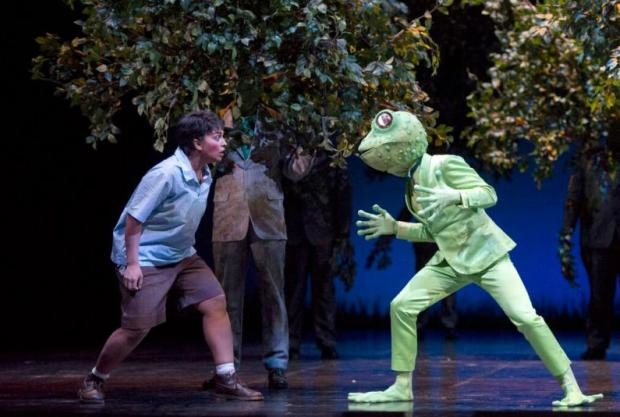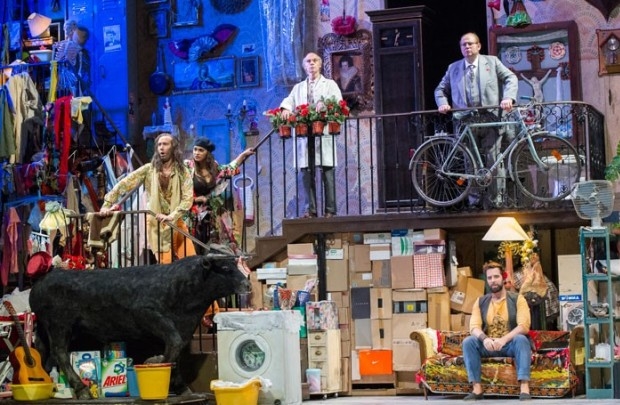Ravel Double Bill (Glyndebourne)

© Richard Hubert Smith
Number six is here and it’s a corker. Glyndebourne regularly serves up an August treat to round off its half-dozen offerings, usually a revival of an earlier hit such as Rinaldo or Billy Budd, and this year it’s dusted down Laurent Pelly‘s 2012 pairing of Ravel’s one-act operas L’Heure espagnole and L’Enfant et les sortilèges.
The spin this time is that Danielle de Niese plays the lead in both operas. Glyndebourne’s own châtelaine (the American star soprano is married to executive chairman Gus Christie) regularly captivates first-night audiences by meeting, greeting and being beautiful; but now she’s back on stage where she belongs, throwing herself into work mere weeks after giving birth to the couple’s first child.
Not that it feels like work. An aura of joy surrounds De Niese whenever she appears, whether as Concepción in L’Heure, a clockmaker’s nymphomaniac wife who’s no better than she ought to be, or as the tantrum-prone Child in L’Enfant, huffing and sulking until the first sprig of reason pierces his consciousness. And her clear, expressive voice is in great shape.
Pelly, a director who’s so much more reliable with comedies and fantasies than he is with ‘straight’ opera, is in his element in both one-acters. From a technical standpoint these are two of the most fiendish operas to stage in the repertoire, but he and his designers Caroline Ginet and Florence Evrard (L’Heure espagnole) and Barbara de Limburg (L’Enfant et les sortilèges) create the overflowing richness of their spectacle with something approaching nonchalance.
Individual performances in this predominantly native-speaking company are all fine, some rather more than that. Baritone Étienne Dupuis all but steals L’Heure as the burly muleteer Ramiro, a happy-go-lucky muscle man whose pheromones are so strong it’s a puzzle Concepción takes so long to catch their waft. And coloratura soprano Sabine Devieilhe in L’Enfant, who sings the Princess, the Nightingale and, in a sensationally staged coup de théâtre, Fire, is fabulously secure and full-toned even in her stratospheric passages.

© Richard Hubert Smith
Jeremy Bines‘s polished Glyndebourne Chorus comes into its own during the exquisitely realised wallpaper sequence in L’Enfant, later joined by a pitch-perfect boys’ chorus, while Robin Ticciati coaxes playing from the London Philharmonic Orchestra that catches Ravel’s perfumed idiom à merveille. It’s a wonderful evening of authentically gallic-flavoured entertainment… But…
…but does L’Heure espagnole quite hang together? Ravel’s isn’t the first name that springs to mind where bawdy romps are concerned and his filigree writing, which is often a slightly staid restatement of his Iberian affections, is at odds with the unapologetic farce of Franc-Nohain’s libretto. Pelly, with his cluttered seventies set and sharply timed production tricks, seems to be staging the text rather than the score. It’s a reasonable choice but one that enhances the disjuncture rather than ironing it out.
Still, it’s undeniably good fun, and that’s what you’ll have if you catch one of the remaining performances. See it and marvel at the magical costumes in L’Enfant et les sortilèges (by Pelly and Jean-Jacques Delmotte), the cleverest of which transforms a nursing mum into a small boy.
The double bill of L'Heure espagnole and L'Enfant et les sortilèges continues in repertoire at Glyndebourne until 30 August










